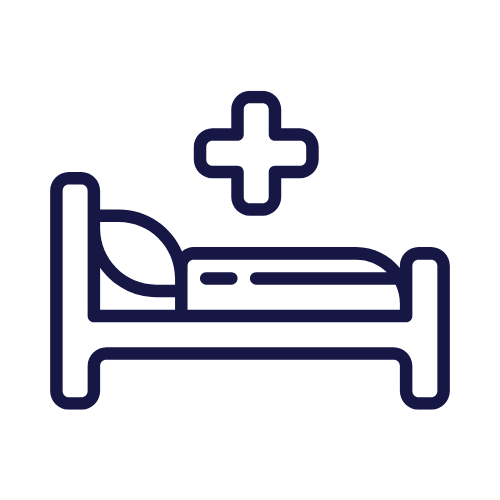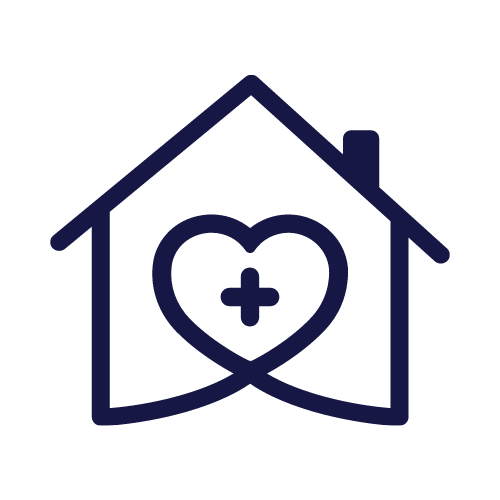YOU CAN RECOVER, WE CAN HELP
How We Can Help Start Your Recovery Journey
“I’d tell myself it wasn’t a lot of alcohol, that I was managing fine. But I wasn’t doing my job right, my marriage was hurting. I had no control, and I didn’t see a way out. I could not imagine a future without alcohol being part of my life.”
If you can’t seem to stop drinking, you’re not alone. Thousands of our patients saw no end in sight, but now live alcohol-free with our evidence-based treatment. Let our experts help you heal. Get the support you need and get your life back.

What Is Alcohol Use Disorder?
Alcohol use disorder is a chronic brain disease where a person loses control of their drinking and keeps drinking despite negative consequences. It isn’t a moral failing or a lack of willpower. It’s chemical changes in your brain that can benefit from addiction treatment. Signs of alcohol addiction can include:
- Feeling lack of control
- Heavy/binge drinking
- Needing more to get drunk
- Drinking alone or in the morning
- Hiding drinking from others
- Stopping activities to drink
- Hurt relationships or career
- Withdrawal symptoms
STATISTICS
Alcohol Abuse in Ohio and Beyond
Hundreds of thousands of Ohioans struggle with alcohol addiction every year. Nearly 531,000 residents had an alcohol use disorder (AUD) in 2017; of these, around 494,000 needed treatment but did not receive it.
In 2014 the Behavioral Health Barometer reported an annual average of about 95,000 adolescents aged 12–17 (10.3% of all adolescents) used alcohol in Ohio in 2014–2015. Of all adults, 19% reported binge drinking habits which can lead to long-term alcohol issues.
Across the U.S., alcohol is the most widely used and abused substance among adults. In 2019, a study completed by the National Survey on Drug Use and Health (NSDUH) found that:
- 85.6% of adults over 18 have consumed alcohol
- 25.8% admitted to binge drinking in the past month.
- 15 million adults have alcohol use disorder (AUD).
- Only 7.3% of adults with AUD received treatment for AUD in a treatment center.
KNOWING WHEN YOU NEED HELP
How Much is Too Much?
How do you know if you are dependent on alcohol and abusing it? To determine if you are drinking too much alcohol, it is important to look at how much you’re drinking, how quickly, and how often. Drinking too much or too often can lead to alcohol abuse, then alcohol dependence, then alcohol addiction, otherwise known as alcoholism. According to the NIAAA, heavy drinking can occur in different ways, including binge and chronic drinking. Binge drinking involves four drinks in one sitting for women and five for men, while chronic heavy drinking involves more than eight drinks per week for women and more than 15 drinks per week for men. If you’re drinking this much or more, you are much more likely to need professional alcohol addiction treatment. However, it’s important to note that many people struggle with alcohol addiction and drink less than this.

YOUR PARTNER IN RECOVERY
Why Choose Our Addiction Treatment Center for Alcoholism?
We believe anyone can overcome alcoholism. Over 40,000 people have trusted The Recovery Village treatment centers with their alcohol use disorders and co-occurring mental health conditions. Patients at The Recovery Village Columbus graduate from our evidence-based rehab with the education, self-awareness and tools they need to live alcohol-free lives. Additionally, our speciality track Fortitude offers veterans, fire fighters and first responders culturally competent, trauma-informed care for their unique occupational needs.
TREATMENT PROGRAMS
Our Alcohol Rehab Programs in Ohio
Recovery happens in stages. Our alcohol rehab programs provide support at each stage to give you the best chance at lasting sobriety.

Medical Detox
Alcohol withdrawal can be deadly. Medical detox makes withdrawal as safe and comfortable as possible with 24/7 medical supervision and treatment for withdrawal symptoms.

Inpatient Rehab
Clients live onsite and receive intensive alcohol addiction treatment daily. Staying onsite helps patients focus entirely on their recovery.

Outpatient Rehab
Clients attend scheduled appointments at the facility, then return home. These patients may continue going to work or school while receiving care.

Dual Diagnosis
Substance use and mental health are often linked. We treat addiction and mental health symptoms simultaneously for better outcomes.

Medication-Assisted Treatment
Medications can help those with severe alcohol use disorders reduce cravings and avoid relapse.

Teletherapy
Online teletherapy through our Nobu mental wellness app brings clients life-changing treatment from the comfort of home.
WHAT TO EXPECT
What Happens in Alcohol Rehab?
At The Recovery Village Columbus, we treat the whole person — not just their alcohol addiction. Our methods are backed by research and results, then personalized for each patient’s needs.
Continuum of Care
People are more likely to relapse if they leave treatment before they’re ready. Our patients can step down to lower levels of care as they get better so they always have the support they need.
One-on-One Counseling
Our licensed counselors help each person address their physical, mental and emotional symptoms and find the root of their drinking behaviors.
Get Well with Peers
Clients receive group therapy to get guidance, fellowship and support from peers who understand the day-to-day realities of alcohol addiction.
Purposeful Relaxation
Downtime helps people to reflect, build friendships with peers and grow hobbies that support recovery. Recreational activities like art therapy support these goals.
Nutritious Meals
Excessive alcohol use can often lead to exhausting nutritional deficits. Our chef creates delicious, nutritious meals that meet clients’ needs as they recover.
Relapse Prevention
Recovery continues long after leaving rehab. Our aftercare program offers client-specific relapse prevention plans, referrals, recommendations and follow-ups.
Questions? We are available 24/7. Call 614-362-1686 Now.
PAYING FOR TREATMENT
Explore your insurance benefits to pay for alcohol rehab in Ohio
Most national and local insurance providers are in-network with The Recovery Village Palmer Lake. We’re equipped to validate your insurance coverage or talk about private payment options with you.

Speak With Admissions
Speak with a Recovery Advocate who can answer your questions and get you started on your recovery journey.

MORE ON ALCOHOL ADDICTION
Alcohol Abuse vs. Alcohol Addiction
Alcohol abuse and alcohol addiction may sound the same, but they are two elements of the more significant problem. Alcohol abuse is the act of drinking excessively or using alcohol to self-medicate. Someone may abuse alcohol even after it causes physical or mental harm.
Alcohol addiction or alcoholism is a chronic medical condition with frequent periods of alcohol abuse and a loss of control over how much or how often you consume alcohol. Alcohol addiction can also occur when someone develops a physical or emotional dependence on alcohol.
Risk Factors for Alcohol Abuse
Numerous risk factors can impact someone’s potential for alcohol abuse or addiction. These can include genetic, physiological, and environmental factors.
People who suffer from mental health disorders such as depression, anxiety or other mood disorders are also at a high risk of developing an addiction or alcohol abuse. Alcoholism can also run in families. If you have family members who have abused alcohol, this could indicate you have a higher likelihood of doing so. However, it does not mean you are destined to become an alcoholic.
Other factors that may impact alcohol abuse can include:
- Stress
- Life events
- Poor life satisfaction
- Trauma
- Pre-existing psychiatric disorder (Schizophrenia, Bipolar Disorder and Personality Disorders)
The Effects of Alcohol Abuse and Addiction
Alcohol misuse or abuse can damage aspects of someone’s life if left untreated. Physical, emotional and social consequences can occur with continued alcohol abuse.
The Physical Consequences
Alcohol abuse and alcoholism can lead to serious physical consequences. Alcohol use is linked to more than 200 diseases. It can lead to health problems and mask symptoms of other problems. Physical health issues can include:
- Hepatitis
- Gastritis
- Heart disease
- Liver disease
- Pancreatitis
- Cancers, including mouth, ovarian, prostate and breast cancer
- Seizures
- Diabetes
- Anemia
- Dementia
- Gout
- Irritable bowel syndrome
On a short-term basis, alcohol can lead to slower reactions, memory and balance problems, trouble with hearing, anxiety and restlessness. Alcoholism and alcohol abuse can also cause errors in judgment that lead to illness or injury, such as unprotected sex or driving under the influence.
The Emotional Consequences
There are numerous consequences of alcohol abuse, and not all are physical. For those suffering from pre-existing mental illnesses such as depression and anxiety, alcohol can be a way to relax and manage everyday stresses. However, serious emotional consequences of overusing alcohol exist. You may do something you regret or neglect your responsibilities. While under the influence of alcohol, you’re more likely to take risks, and your judgment is clouded. This leads to more stress and anxiety and, in turn, more alcohol.
The Social Consequences
People often drink for social reasons. Going out for a drink or having a drink with dinner is commonplace, but excessive drinking is socially unacceptable. Unfortunately, people often drink to increase their positivity, make social events more enjoyable, reduce discomfort and avoid social rejection.
Alcohol abuse can lead to withdrawing from your friends and family as you try to hide the extent of your illness. Your relationships could suffer from your behavior or inappropriate public behavior. If you drive under the influence, you could lose your driver’s license and even your job if you show up to work drunk, for
VIDEO RESOURCES
Alcohol Rehab at The Recovery Village Columbus
7 Myths About Alcohol Rehab
Why Alcohol Addiction is an Abusive Relationship
Ready to start your recovery?
We’re available to answer any questions, confirm your insurance benefits and schedule individualized treatment that works for you.

